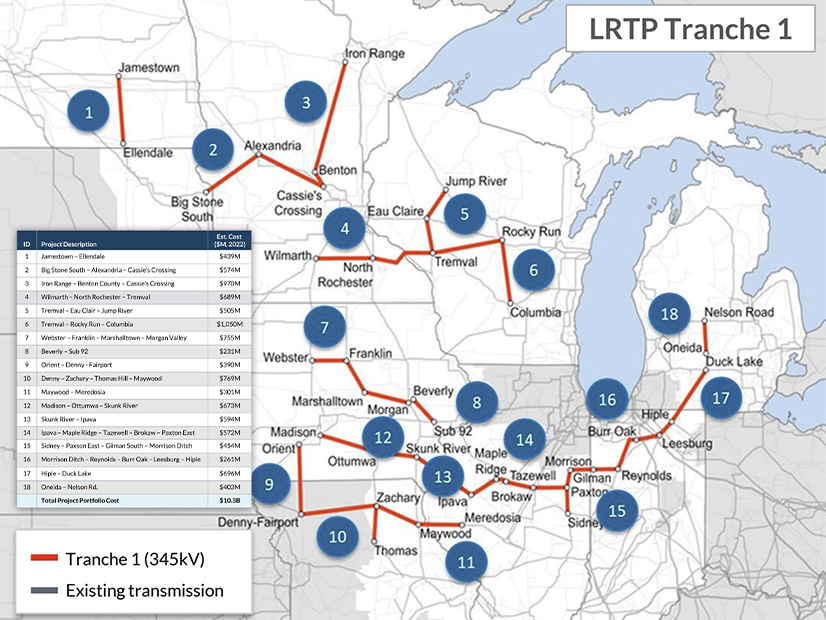MISO’s response to FERC’s proposed transmission planning rule will emphasize its worry that it could be too arbitrary and bog down the RTO with compliance check marks.
The grid operator plans to send comments to the commission in August warning against an overly prescriptive rulemaking. It will say it is concerned over the notice of proposed rulemaking’s level of detail and specifics and that “ongoing compliance will impede ongoing expansion.”
However, some stakeholders said this week they are worried that MISO’s fixation on specifics could leave the nation with another toothless transmission rulemaking.
MISO staff said its transmission planning already covers the NOPR’s suggestion for scenario-based regional transmission planning (RM21-17). (See FERC Issues 1st Proposal out of Transmission Proceeding.)
During a Planning Advisory Committee (PAC) meeting Wednesday, MISO’s Jackson Evans said that while the RTO supports the aim of long-term, scenario-based planning, grid operators need flexibility “to meet the unique needs of the regions and their stakeholders.”
“There’s really no one way to do this correctly,” Evans said. He said MISO doesn’t want to be forced to “take resources away from its existing planning and devote them to compliance.”
Evans said an overly prescriptive rule might imperil the grid operator’s ongoing planning under its long-range transmission plan (LRTP) and its joint targeted interconnection queue (JTIQ) study with SPP.
“MISO was a leader in this area before this week,” Evans said, referencing the Board of Directors’ approval of the $10.3-billion LRTP Monday. (See MISO Board Approves $10B in Long-range Tx Projects.)
MISO said FERC should “order direct changes to regions it deems to be insufficient in meeting objectives” and said the commission should exercise its Section 206 authority and “tailor its focus” to regions that are not performing robust planning.
Stakeholders Push Back
Multiple stakeholders said FERC Order 1000’s failure to spur transmission projects is evidence that the commission should be more prescriptive, not less, when it comes to planning.
“I’m not saying we need a nanny state, but we need a prescriptive set of requirements,” the Union of Concerned Scientists’ (UCS) Sam Gomberg said during a cost-allocation meeting Tuesday.
Others said MISO should assume there’s always room for improvement and that FERC’s final rule could help the RTO achieve better quality planning.
“I think it would be arrogant to assume we’re doing it 100% right and we’re perfect,” Customized Energy Solutions’ Ginger Hodge said during the PAC meeting.
Andy Kowalczyk of activist group 350 New Orleans suggested MISO highlight the ingredients of its planning success with FERC to help shape minimum requirements. “I strongly urge MISO to lean not too hard into flexibility,” he said.
“MISO is a leader in transmission planning, but that doesn’t mean we can and shouldn’t do better,” Sustainable FERC Project attorney Lauren Azar said.
Azar said MISO’s planning aims can be swayed or stymied by stakeholders, who are in some instances able to “thwart” transmission planning. She pointed to the 2017 regional transmission overlay, which failed to yield a project, as an example. (See Early Release for MISO Long-Term Tx Overlay Study.)
“We’re more than five years behind in building out a grid,” she said.
Azar said some nationwide standards could help MISO and the nation overcome resistance to grid expansion.
Mississippi Public Service Commission attorney David Carr disputed the idea that the 2017 regional overlay study was ever meant to result in projects. He characterized the study as MISO’s response to the Clean Power Plan, which was ultimately struck down.
Basking in LRTP’s Afterglow
MISO took a victory lap after approving its first LRTP portfolio.
During an executive update Tuesday, Aubrey Johnson, vice president of system planning, said he was “pleased and excited” that the board voted in favor of the LRTP’s 18 lines. He said staff will now study a second set of transmission needs for MISO Midwest that considers a more rapid fleet change and decarbonization.
“Growing pressures on the fossil fuel industry are accelerating retirements,” Johnson said. He added that new renewable energy additions aren’t currently keeping pace as a reliable, accredited replacement.
“It is clear that the future is going to look very different than the past,” he said.
With the LRTP’s approval, MISO and SPP’s JTIQ study investment will shrink from $1.65 billion to $1.06 billion. The portfolios contain the same two 345-kV projects in North Dakota and Minnesota. MISO decided several months ago that it would independently pursue the projects under its regional planning; it has said SPP’s share of benefits from the projects are negligible and not worth pursuing in cost splits. (See MISO Stakeholders Uneasy Over Long-range Tx, JTIQ Overlap.)
The NOPR and long-term planning discussion come as MISO’s cost-allocation stakeholder group mulls new benefit metrics for transmission projects that strengthen the grid’s reliability and resilience. On Tuesday, the group discussed how to quantify the benefits of a line’s ability to withstand extreme weather events and valuing a minimum transfer capability.
Climate scientist Rachel Licker, with UCS, said it’s clear that climate change is driving more common and longer-lasting heat waves, which will intensify air conditioning demand. She said MISO may be underestimating future demand for cooling in its modeling. Licker added that nighttime lows are no longer dipping to historic averages, making air conditioning use at night more common.
Gomberg said MISO should value transmission that helps achieve decarbonization to avoid more devastating heat waves and storms, which can decimate power lines and equipment.




